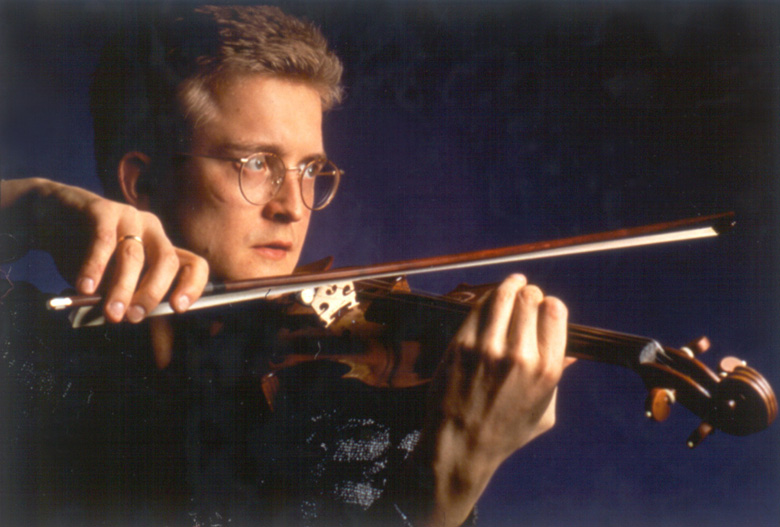Specifically, they are inviting anyone to submit a remix of their recording of the first movement of Mahler’s first symphony. As radical as you like. The site’s here.

Personally I have no problem with Mahler retakes by the likes of Matthew Herbert.

But this competition lacks focus. What, exactly, are the Berlin Phil trying to achieve – except, perhaps, to seem trendy?
I have it on the authority of his record producer and good friend Paul Myers that the Canadian piano legend was deeply smitten with the music of David del Tredici. He called A Final Alice (conducted by Solti) ‘Mahler on acid’, a perfectly euphonious compliment.
Paul has a further secret to share about Glenn’s attire: ‘Whenever he was to be photographed, he would, as instructed, arrive with a clean shirt, still in its pins and wrappings, but he didn’t own a tie, so what you saw was what I was wearing.’

(c) Don Hunstein/Lebrecht Music&Arts
Sony has just released a boxed set of Glenn on TV. Check those ties. Paul was ever a natty dresser.
When director Christoph Schlingschief died of lung cancer last year, the one project he talked of to the last was his dream of creating a centre for opera in the middle of the African continent, in Bukina Faso.

Three of his close friends – directors Amelie Deuflhard, Matthias Lilienthal, and ex-Bundestag vice-president Antje Vollmer – have worked devotedly to make his wish come true. The village opens October 9. Watch the video here.

Mark Gorenstein made a name for himself by abusing an Armenian soloist at the Tchaikovsky competition.
He was already at loggerheads with the Svetlanov Orchestra, of which he is artistic director. The players this summer demanded his dismissal. Gorenstein, who has a cousin in high places, went off sick. Now he’s back, recovered, ready to work.

At the first rehearsal, you can see only four players on stage. The others are staging a sit-in strike in the hall. The stand-off lasted four hours. Here’s the video.
And here’s the translated report, with live video, from 
The Salzburg Festival has picked one Wagner opera for the 2013 bicentennial. It’s Meistersinger and the director is… Norwegian.
It’s Stefan Herheim, according to the well-informed wagneropera.net.
That same year, which is also the Verdi bicentenary, he’ll be directing I Vespri Siciliani at Covent Garden.
It’s what the BBC calls multi-tasking.
Herheim, 41, is getting to be very big in Europe. The Met have not yet got his phone number.

Conductor Daniele Gatti, director Stefan Herheim and Mihoko Fujimura (Kundry) discussing the score.
Photo: Enrico Nawrath/Bayreuther Festspiele.
Here’s a video on youtube of Evgeny Mravinsky conducting the third movement of Shostakovich’s eighth symphony.

I have watched it five or six times over two days, never having witnessed so lucid a demonstration of what a great conductor of the old school can do with the soundtrack of his own lifetime. I have even watched it with the sound off.
The film is rare in many ways – that it exists at all; in good sound and colour; and that it is shot by a film director who understands conducting. In short, a miracle.
The orchestra is the Leningrad Philharmonic, concertmaster Viktor Liberman.
 I expect to watch it many times more.
I expect to watch it many times more.
Citigroup, the default owners, have set October 5 as the final date for best-offer bids on the failing record giant.
That’s ten days to change the music world.

Smart money is on Warner, the only major player that will not attract a monopolies or antitrust investigation (as Sony or Universal would).
But don’t discount Murdoch. The empire has cash to spare and likes surprises. Of the non-hacking kind.
Dmitri Medvedev, the Russian president, has promised that other leaders will sit beside him at the Bolshoi’s gala reopening on October 28.
It should have been ready in 2008, but what with thing and another…. you know how it is. Anyway, Placido Domingo, who dropped by in July, said it sounds great. Which is one of several English words for ‘bolshoi’.
You can watch it live on Russian telly. No performance details yet.

The latest talent to jump – or be pushed – off a major-label bandwaggon is Christian Tetzlaff.

He was with with EMI and before that with DG. Now he’s with the Finnish indy Ondine, the one that burnt its fingers with a Philadelphia Orchestra-Christoph Eschenbach deal just before the music director was given the push.
They should do better with Tetz. His first release is the Mendelssohn concerto, with the Frankfurt Radio orchestra, conductor Paavo Järvi.
The immortal Canadian pianist – he would have been 79 this week, had he lived – is the subject of a new stage presentation in Munich, based on his own words. From the press materials I have been sent (below), it appears the authors regard Gould as a split personality, at odds with himself.

photo: (c) Don Hunstein/Lebrecht Music & Arts
Christopher Robson sings and Danny Exnar plays (in two senses) the title part. I wonder if he’d tell us more about it during rehearsals?

„Ich hatte es nie gelernt, die Nähe des
Publikums zu genießen“
Glenn Gould ist eine Legende. Jeder will ihn
hören. Als 25-Jähriger verkündet er, mit 30
keine Konzerte mehr zu geben. Tatsächlich
macht er diesen unerhörten Schritt. Seinem
Publikum schenkt er eine riesige Diskographie.
2012 ist das Jahr seines 80. Geburtstags und
zugleich seines 30. Todestags.
„Glenn Gould vs. Glenn Gould“
Was diese Aufführung anstrebt, hätte Glenn
Gould verabscheut: ihn, den Eremiten, den einsamen „Spinner“ dem Publikum näher bringen,
ihn aus seiner selbstgewählten Einöde entführen und dem Publikum „auszuliefern“. Welch
ein Horror!
Er war ein Zerrissener, denn was die Welt von
ihm wollte, das wollte er nicht: er wurde ungewollt Legende, Popstar oder wie man sagte, der
„James Dean der klassischen Musik“. Er wollte
nicht berührt werden, kein Publikum im Saal,
kein Händedruck, von wem auch immer.
Glenn Gould wollte in seiner Introvertiertheit
leben. Er liebte die menschenleere Weite Kanadas. Der Norden war ihm nicht nur eine stille,
fordernde Gegend; er war ihm eine Geisteshaltung. In der Garnisonsmentalität des Torontos
seiner Kindheit, einer britischen Stadt, in einer
britischen Provinz, weit draußen im britischen
Empire, wurde er zum „letzten Puritaner“.
Aber der lautstarke Musikbetrieb zerrte ständig
in eine andere Richtung: Konzerte, Pressekonferenzen, Wettbewerbe, Marketing für Geld und
Gold. –Das Publikum verfolgt ihn mit ewig gleichen Programmwünschen. Das Studio wurde
seine Barriere, hinter der seine Zerbrechlichkeit
Schutz suchte. Hier erforschte er, hier erlebte
er seine Musik – mit den technischen Möglichkeiten seiner Zeit. Seine Liebe gehörte nur der
Musik und dem Streben nach Reinheit mit Perfektion.
Glenn Gould lebte das klassische Dilemma zwischen Nähe und Distanz. Und er folgte kompromisslos seiner Neigung. Die autistische Attitüde
seines Auftretens war auch Tarnung: er suchte
in Allem das Selbe: Sicherheit, Liebe, Heimat,
Schönheit.
Die Performance „Glenn Gould vs. Glenn
Gould“ ist also das fast aussichtslose Unternehmen, diesen leidenschaftlichen Eremiten
und so abweisenden, verrückten Liebhaber für
einige Augenblicke ins Licht zu stellen, Verständnis zu schaffen und Einblick in sein hochkomplexes Rebellentum.
G
C
herbuliez
P
roductions
lenn Gould vs. Glenn Gould
Eine musikalische Theaterperformance
18. und 19. Oktober 2011, 20.00 Uhr,
Carl-Orff-Saal im Gasteig, München
Danny Exnar und Christopher Robson.
Bernd Zimmer.
Gert Pfafferodt
Glenn Gould und T.S. Eliot.
Johann Sebastian Bach,
Richard Wagner und
Arthur Hamilton.
Alle Musik ist live.
25,– 21,– 17,– 12,– (erm.) Euro
über München Ticket, Tel. 089 54818181
www.muenchenticket.de
Cherbuliez Productions,
Buchendorf
www.cherbuliez.com
in Zusammenarbeit mit Art Bureau München
Simone Lutz PR
simonelutz.pr@gmx.de
Hotel München Palace
Kulturreferat der Landeshauptstadt München
Piano-Fischer Musikhaus GmbH & Co. KG,
München
Pianohaus Zechlin GmbH, Ahrensburg
für den Glenn Gould Chair
Yamaha Music Europe GmbH, Paris
für den Konzertflügel
Uraufführung
Mit
Bühne
Regie
Texte
Musik
Karten
Produktion
Pressearbeit
Dank an© Bernd Zimmer
C
herbuliez
P
roductions
Glenn Gould
Foto: Don Hunstein
© Sony Music Entertainment
Danny Exnar
© Danny Exnar
© Thomas Lüttge
Christopher Robson
© schneiderphotography.de
The London Philharmonic Orchestra, besieged for suspending four players who signed an anti-Israel letter, yesterday finished recording its 205th anthem – Zimbabwe – for next summer’s London Olympic Games.
The marathon project includes the Israeli anthem, Hatikvah. But what if Palestine gets recognised by the UN between now and then. Will the orchestra have to go back to the drawing board?
UPDATE: Philip Sheppard, who arranged the anthems has tweeted an answer to my first question: ‘Yes! Since 1996 the Palestinian territories have fielded an Olympic team. They have an anthem which we recorded.’ (Thanks, Philip)
Next question: is being paid to record the anthems of Iran and Zimbabwe a non-political act? Did none of the players decline?

A member of the Guildford audience filmed what happened after the lights went out in the town’s new concert hall.

After completing his concerto with the orchestra in pitch-darkness, Tchaikovsky winner Daniil Trifonov calmly played Chopin.
According to the Surrey Ad it was filmed by “Mark Williams, who runs William’s Newsagents in Onslow Village”. That man’s way ahead of the news.









 I expect to watch it many times more.
I expect to watch it many times more.





